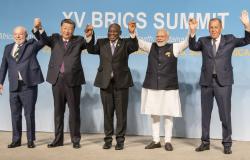
Informal intergovernmental organizations (IIGOs), such as G20, G7, and BRICS, have become increasingly pivotal actors in global governance. By implication, they are afforded a key role in advancing the Sustainable Development Goals (SDGs). Without a permanent secretariat, however, IIGOs govern through orchestration, relying heavily on intermediary organizations. For instance, the G20 frequently enlists the OECD to provide analytical support and to implement its Action Plan on the 2030 Agenda for Sustainable Development. This article examines the dynamics between informal and formal international organizations, exploring how IIGOs choose specific intermediaries. Using the case of the G20 and a mixed-method approach, I examine how IIGOs select intermediaries to promote the SDGs. To do so, I extend Downie's (2022b) G20 orchestration dataset, providing a more comprehensive resource for global governance studies. I find that the G20 considers both goal alignment and the focality of the intermediaries, favoring intermediaries with common members and greater public attention. By shedding light on IIGO–intermediary dynamics, this research enhances understanding of institutional interactions within hybrid institutional complexes (HICs) and provides insights for strengthening international cooperation, which are particularly important to facilitating sustainable development.